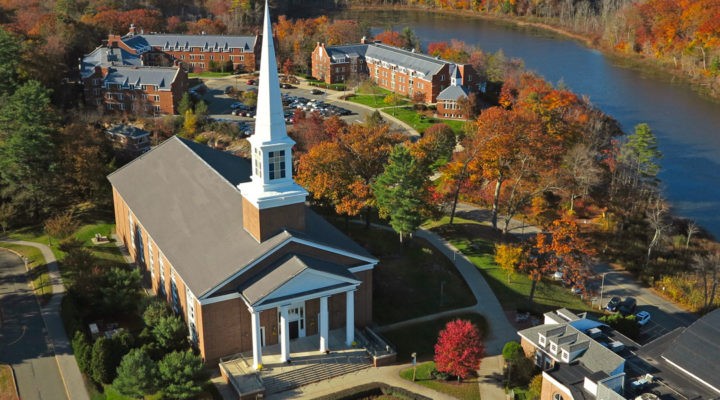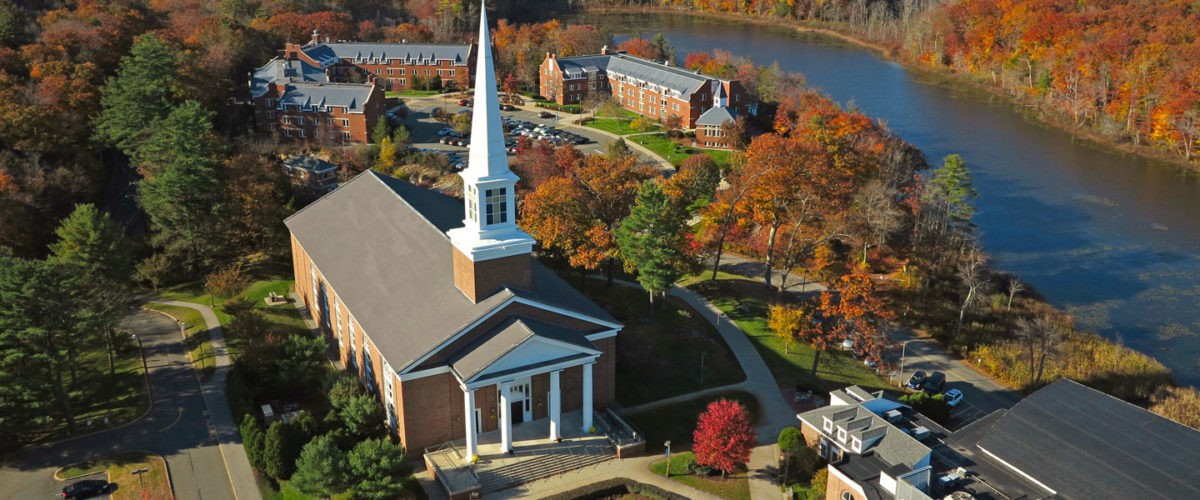The highest court in Massachusetts ruled this month that a social work professor at a nondenominational Christian college is not a “minister,” meaning she may proceed with a discrimination suit against the college. Meanwhile, a Baptist university in Missouri claims a faculty member and student may not challenge its governance decisions because it is a religious institution beyond the court’s purview.
The two cases illustrate yet another front in the current battle to define or redefine religious liberty in America: When may a faith-based institution be shielded from court scrutiny of its governance because it is a religious institution?
Defining the ‘ministerial exception’
The Massachusetts case, an opinion handed down by the state’s Supreme Judicial Court March 5, has the potential to define this question far beyond New England, because it relies on an interpretation of a landmark Supreme Court ruling.
The Massachusetts high court ruled that the “ministerial exception” — which shields religious institutions from employment-related lawsuits brought by employees with ministerial roles — does not extend to a social work professor who claims she was denied tenure by unlawful discrimination. The college had claimed this exemption as a reason for the case to be dismissed outright.
In 2020, the U.S. Supreme Court ruled in Our Lady of Guadalupe that the exception did apply to grade school teachers in Catholic elementary schools whose function included teaching religion classes, praying with students and attending chapel with students. Thus, those teachers’ discrimination claims were disallowed. Due to the ministerial exception, courts will not get involved in ecclesial disputes.

Margaret DeWeese-Boyd
The situation faced by Margaret DeWeese-Boyd at Gordon College differs from that scenario, the state court ruled.
“We conclude that Gordon College is a religious institution, but that the plaintiff, Margaret DeWeese-Boyd, is not a ministerial employee,” the ruling explained. “Her duties as an associate professor of social work differ significantly from cases where the ministerial exception has been applied, as she did not teach religion or religious texts, lead her students in prayer, take students to chapel services or other religious services, deliver sermons at chapel services, or select liturgy, all of which have been important, albeit not dispositive, factors in the Supreme Court’s functional analysis.”
In Our Lady of Guadalupe, the U.S. Supreme Court reaffirmed the ministerial exception it had first stated in the 2012 case Hosanna-Tabor but still did not explicitly define it.
Writing the Supreme Court’s opinion in Hosanna-Tabor, Chief Justice John Roberts said, “Allowing anti-discrimination lawsuits against religious organizations could end up forcing churches to take religious leaders they no longer want. Such action interferes with the internal governance of the church, depriving the church of control over the selection of those who will personify its beliefs. By imposing an unwanted minister, the state infringes the Free Exercise Clause, which protects a religious group’s right to shape its own faith and mission through its appointments.”
But, Roberts said, since this was the first time the high court ever considered the “ministerial exception,” it would not set hard and fast rules on who can be considered a religious employee of a religious organization.
Can all employees be ‘ministers’?
Gordon College’s president, Michael Lindsay, has previously stated that he considers all the school’s employees, even custodial staff, to be ministers.
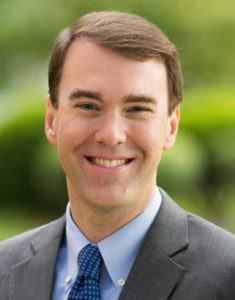
Michael Lindsay
According to the Massachusetts ruling, Lindsay “testified that when he interviews a faculty member, he ‘will liken joining Gordon College to joining a religious order.’ Formal religious training is not, however, required for employment at Gordon, although some professors have seminary degrees. Professors with seminary training do not have different titles from other professors.”
In 2016, over the objection of some faculty, Lindsay sought to update the Faculty Handbook to say: “In the Gordon College context, faculty members are both educators and ministers to our students.”
But the Supreme Court in its most recent decisions on the ministerial exception said just because an employer calls someone a “minister” doesn’t mean they are. However, the Supreme Court also did not offer a firm definition of who should be classified as a “minister.” Chief Justice Roberts wrote at the time, “We are reluctant … to adopt a rigid formula for deciding when an employee qualifies as a minister.”
Thus, the Massachusetts high court ruling, if appealed by the college, could bring the issue back to the U.S. Supreme Court. Or if simply left standing without higher-court action, the Massachusetts ruling would add its own bit of definition to the otherwise open-ended question.
Back to the question of discrimination
In the meantime, the latest ruling means DeWeese-Boyd would be free to continue her discrimination case against Gordon, which is a significant claim in its own right.
The professor asserts that the college’s president and provost “unlawfully retaliated against her for her vocal opposition to Gordon’s policies and practices regarding individuals who identify as lesbian, gay, bisexual, transgender or queer (or questioning), and others …, by denying her application for promotion to full professor, despite the fact that the faculty senate unanimously recommended her for the promotion.”
Religious entities are allowed wide range to discriminate in hiring and personnel management of certain employees but not all.
What is significant here is that religious entities are allowed wide range to discriminate in hiring and personnel management of certain employees but not all. For example, churches are allowed to discriminate in their hiring of clergy so as to engage clergy who share the church’s doctrinal beliefs.
If DeWeese-Boyd does not have ministerial classification in her work, a different court standard could apply.
Since this litigation began in 2017, Gordon College has eliminated the social work major, reshaping the department in which DeWeese-Boyd worked.
In 2019, 13 of the school’s 90 areas of study became part of a “strategic restructuring” that merged the social work program with elements of sociology and psychology to become a “social welfare” program of study.
The college blamed “strict guidelines from the Council on Social Work Education” that had become “financially challenging” for the college to maintain.
DeWeese-Boyd was not the first Gordon professor to allege discrimination or retaliation for speaking against Lindsay’s and the college’s treatment of LGBTQ issues. In 2016, associate professor of philosophy Lauren Barthold settled a lawsuit against the college on undisclosed terms. She resigned her tenured faculty position after saying the school retaliated against her for speaking out against its treatment of gay people.
Questions of school governance in Missouri
At the same time as the Massachusetts ruling last week, a separate dispute related to a private, faith-based university and the courts took a new turn in Missouri. There, Southwest Baptist University and the Missouri Baptist Convention have been entangled in governance battles for the past two years.
The root of the issue has been whether the state Baptist convention may completely control the board of trustees for the university and thereby set its academic and doctrinal standards, including hiring and promotion of faculty.
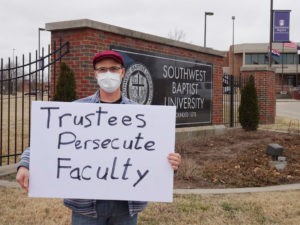
A protestor at Southwest Baptist University. (Photo by Brian Kaylor/Word&Way)
In the latest round, as reported by Word&Way, a Southwest Baptist University professor and a student joined a legal effort March 5 to block new governing documents for the school, located in Bolivar, Mo.
A university attorney claims the school’s legal documents are beyond such scrutiny because the school is religious in nature.
Donald Jump, a Baptist layman in Bolivar, filed a petition with the Circuit Court of Polk County on Feb. 22 to block the new governing documents. Before a hearing on his motion, the unnamed professor and student filed a similar joint petition to intervene.
SBU’s attorney argued the school’s religious status made it immune from such legal scrutiny.
“The dispute alleged is not between SBU and MBC, but between Intervenors’ religious opinions on one side and the Baptist entities on the other side,” the attorney said on behalf of the university. “Intervenors’ attempt to inject their religious opinions in opposition to the proposed charter is not a controversy in which the court should be entangled.”
However, neither the professor nor the student mentioned doctrinal statements of theological issues in their filing. Rather than expressing “religious opinions,” the two offered legal arguments involving faculty contractual agreements and the school’s accreditation.
In its legal reply to the suit, the university stated: “The relationship of MBC and its entities is an essentially religious and spiritual relationship, expressed in terms compatible with corporate law. The confessional and corporate relationship between MBC and SBU is clearly an ecclesiastical matter and one which the courts of this state should not become involved.”
Vote of no confidence
Meanwhile, on March 12, the faculty at Southwest Baptist University passed a resolution expressing “no confidence” in the school’s board of trustees. The unprecedented move came after the board denied tenure or promotion to several faculty members.
On March 12, the faculty at Southwest Baptist University passed a resolution expressing “no confidence” in the school’s board of trustees.
The faculty vote was reported by Word&Way to be about 60% in favor of the no-confidence resolution.
In February, university trustees denied tenure to three faculty members in the Division of Behavioral Sciences and denied promotion to two other faculty members. A student petition launched to support the professors and the Faculty Senate passed a resolution on Feb. 13 affirming the five professors and requesting the trustees meet with a delegation of faculty about the denials and explain in writing the justifications for the decisions.
McRaney case
While the Massachusetts and Missouri cases seek to define religious liberty rights for faith-based institutions, another significant religious liberty case continues to wind its way through the courts as well.
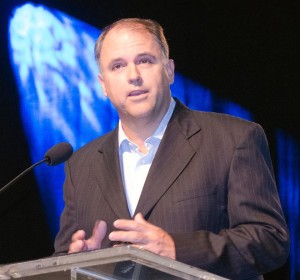
Will McRaney
That case involves the 2015 termination of Will McRaney as executive director of the Baptist Convention of Maryland and Delaware, one of 42 autonomous state and regional conventions that willingly cooperate with the Southern Baptist Convention and its agencies.
McRaney claims that because he resisted changes demanded of his state convention by the SBC’s North American Mission Board — and specifically its president, Kevin Ezell — Ezell and other NAMB officials demanded McRaney’s termination by the two-state convention.
McRaney, an ordained minister, clearly meets the Supreme Court definition of a “minister,” but this case challenges the ministerial exception on a different front because his claim is not against his former employer but against NAMB as a third party, who did not employ him.
With additional reporting by Brian Kaylor/Word&Way
Related articles:
SBC agency’s appeal to Supreme Court touches on religious liberty, defamation and Baptist autonomy
Supreme Court sides with churches in employment fights
The Supreme Court term: Something for everyone to love and hate
Southwest Baptist University president resigns in struggle with Missouri Baptist Convention

